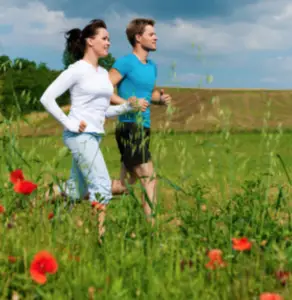A quick overview of fitness, health and beauty benefits from two things Italians love

Olive Oil: Liquid Energy
The monounsaturated fat or MUFA in olive oil may act as an anti-catabolic nutrient, which means it prevents muscle breakdown by lowering levels of the cellular protein called tumor necrosis factor-a, which is related to muscle wasting and weakness. All olive oil is high in MUFAs, but extra-virgin olive oil (EVOO) has a higher level of free-radical-fighting vitamin E too.
Olive oil and monounsaturated fats have been associated with everything from lower rates of heart disease and colon cancer to a reduced risk of diabetes and osteoporosis.
It also helps keep arteries supple and helps prevent colon cancer as well: maybe as much as fruits and veggies, according University of Oxford researchers. Studies also indicate that extra virgin olive oil may help to lower blood pressure and olive oil promotes the secretion of bile and pancreatic hormones naturally, and lowers the incidence of gallstones.
So what are some ways you can up your intake of EVOO?
- Serve a small condiment dish with extra virgin olive oil to dip bread, or serve with potatoes or other vegetables instead of butter. Try adding a few drops of balsamic vinegar to it or a sprinkling of your favorite spices to the olive oil for a great flavor.
- Substitute extra virgin olive oil for other cooking fats. Use it to sauté, marinate and roast food in place of butter, lard or other types of oil. Remember though, olive oil still contains fat and calories, so watch your intake.
- Make salad dressings with extra virgin olive oil. Prepare your own healthy topping for your favorite salad by combining olive oil with herbs, vinegar or lemon juice. Experiment with flavors to find those you like the best. Making your own dressings allows you to control how much extra virgin olive oil is used. You can also use extra virgin olive oil to make marinades, sauces and gravy.
- Swallow extra virgin olive oil to reduce the discomfort from a sore throat. A spoonful can soothe a sore, dry or scratchy throat when you have the common cold, allergies or strep throat.
- Add extra virgin olive oil to your skin-care routine. Drizzle some in your bath or rub it into your skin to keep it moist and healthy. These benefits also result from eating virgin olive oil, but the results from direct contact with your skin are evident right away. You can also combine extra virgin olive with sugar and use the mixture to exfoliate your skin when it is dry and flaky. Extra virgin olive oil can also improve the health and look of your hair and nails when applied directly to them as a moisturizer.
Coffee: Extend Your Workout
Physiologically, caffeine makes us you feel alert, pumps adrenaline to give you energy and changes dopamine production to make you feel good. Another espresso anyone?
Fueling your workout with caffeine will help you lift longer. A recent study published in Medicine and Science in Sports and Exercise found that men who drank 2 1/2 cups of coffee a few hours before an exercise test were able to sprint 9 percent longer than when they didn’t drink any. (It’s believed the caffeine directly stimulates the muscles.) Sure there are drinks with added caffeine, but in many cases, not all the additives are good for you. A simple cup of coffee or espresso will do the trick without the unnecessary extras.
And since sprinting and weight lifting are both anaerobic activities—exercises that don’t require oxygen—a jolt of joe will help you pump out more reps. Do not drink it if you have a history of high blood pressure.
Researchers are studying the possibility that caffeine in coffee has the ability to block the chemicals in the body that cause soreness after a workout and to reduce pain overall. These findings potentially offer the idea that coffee can help you to workout harder and longer because you will be less sore as a result.
The additional benefits of coffee have been well studied and documented. Harvard researchers found that coffee drinkers have a 30 percent lower risk of Parkinson’s disease than nondrinkers. Coffee has also been acknowledged for its high antioxidant content, which more than triples that of green tea.
It’s a common misconception that espresso has more caffeine than regularly brewed coffee. The average single shot of espresso (made with arabica) contains between 45 and 70 mg of caffeine. One 8-oz. cup of brewed coffee can contain between 106 and 200mg of caffeine. Normally, the stronger tasting and darker the coffee – the more roasted it is and the less caffeine it contains.
Since espresso doesn’t refer to a type of coffee, but rather the brewing method used to make it, how much caffeine in it will depend upon the beans used. Robusta coffee beans contain 40-50% more caffeine than arabica coffee beans. In Italy, many espresso blends are based on dark-roasted robusta.